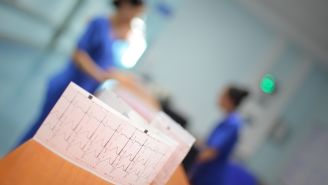If you sometimes feel like your heart “skips a beat”—even when you’re simply drifting off to sleep—it may seem like cause for alarm. The truth is, your heart isn’t really missing a beat. In fact, that sensation, also known as a heart palpitation, is actually an extra beat. While that sounds ominous, it’s usually harmless.
“There is a normal heartbeat, an extra beat and then a slight pause followed by a stronger-than-normal beat,” explains Nelson A. Prager, MD, a cardiologist at The Medical Center of Aurora in Aurora, Colorado.
Understanding why this happens, when you should see your doctor and how you can manage bothersome palpitations can help you feel more at ease.
How the heart “skips a beat”
A “skipped beat” occurs when your heart’s normal steady rhythm is disrupted by an early, extra beat. If this early beat arises from the heart’s upper chambers (atria), it’s known as a premature atrial contraction (PAC). If it originates in the heart’s lower chambers (ventricles), it’s called a premature ventricular contraction (PVC).
Normally, the heart’s chambers fill with blood before each beat. But an extra beat can occur if an abnormal electrical signal triggers an early contraction when the chambers are not yet full, resulting in less blood flow to the body. After this early contraction, the heart’s chambers rest a bit longer than usual before resuming a normal rhythm. During this brief pause, the heart fills with more blood, giving the next beat extra oomph, Dr. Prager notes.
“It is spontaneous electrical activity,” he says. “It can feel like a fluttering in your chest.” For some people, heart palpitations just make them feel uneasy. In more extreme cases, they could make it seem like your heart is flip-flopping or pounding in your chest or neck.
Signs of a more serious issue
While palpitations may be uncomfortable, they’re common and usually not harmful, Prager advises.
People of all ages may be affected. Certain lifestyle factors that produce an adrenaline rush, however, could increase your risk. Things like fatigue, caffeine, alcohol, stress and exercise, for example, can all cause levels of this hormone to rise, resulting in PVCs. Using illegal drugs or taking certain medications, such as decongestants and antihistamines, may have the same effect. Being dehydrated or skipping meals, which can lead to low blood sugar, can also lead to palpitations.
When it comes to PVCs, in particular, whether or not these “skipped beats” are cause for concern depend on their frequency and the severity of your symptoms.
Palpitations that happen only once in a while are usually nothing to worry about—unless you feel dizzy, faint or short of breath when they occur. But if you’re experiencing them very often throughout the day, or in quick succession, it’s a good idea to visit your primary care physician (PCP).
PVCs that persist or occur very often may be linked to heart disease, heart failure, high blood pressure or a weak or injured heart muscle. They may also be associated with low blood levels of certain electrolytes, including potassium or magnesium.
If PVCs happen very frequently, or one right after another, they could also result in a serious type of arrhythmia, or abnormal heartbeat, known as ventricular fibrillation (VFib).
“Frequent PVCs occurring with heart disease can lead to dangerous heart rhythms and even sudden cardiac death, but this is very rare,” Prager says.
How PVCs are detected
If you are experiencing consistent or prolonged heart palpitations, or if you’re having PVCs and you’ve had a heart attack or have a structural heart abnormality or heart disease, visit your PCP. You should also see your healthcare provider right away if you have serious symptoms, including chest pain, lightheadedness or sudden shortness of breath, particularly if these symptoms worsen over time.
PVCs can be hard to detect during an exam but there are certain tools and tests your doctor can use to search for clues that can help determine what’s causing your symptoms.
By listening to your heart and conducting a thorough medical history and physical exam, your doctor may be able to hear a murmur or other signs of a possible heart valve problem. Your PCP may also order blood tests to rule out an underlying condition that may be causing your palpitations, such as a thyroid or electrolyte imbalance or anemia. Your PCP may also refer you to a heart specialist who will order additional tests to make sure your heart is healthy.
PVCs often are discovered during an electrocardiogram (EKG or ECG), a test that measures the heart’s electrical activity. During this test, electrodes are placed on your chest, arms and legs to record your heart's electrical signals.
If your PVCs occur randomly or infrequently, however, an EKG may not detect them. In this case, your doctor may ask you to wear a portable monitor, such as a Holter monitor, which can help detect any abnormal heartbeats over a longer period of time. Among people with no known heart disease, PVCs are picked up in 1 percent of EKGs, while Holter monitors note occasional PVCs in up to 80 percent of healthy people.
In some cases, an exercise stress test may be used to record your heart's electrical activity while you walk on a treadmill. It can help determine if your PVCs are triggered by physical activity.
Considering treatment options
Most of the time, there is no underlying disease causing PVCs, and they will simply go away on their own, according to Prager. “Many individuals are comforted to know that these extra beats aren’t harmful,” he says. “This reassurance can be enough.”
For some people, however, these palpitations and the symptoms they cause may be bothersome enough to warrant treatment, he adds.
This may be as simple as making some adjustments to your lifestyle habits, such as drinking plenty of water, getting enough sleep, eating regular meals, limiting alcohol and caffeine, not smoking, avoiding decongestants and antihistamines and taking steps to reduce your stress level. It may be impossible to avoid stress entirely, but finding new coping strategies could help, such as incorporating meditation, deep breathing or another relaxation technique into your daily routine.
If PVCs happen often enough to reduce your heart’s pumping ability and you feel weak, dizzy or faint, the left side of your heart may be working harder to pump the same amount of blood. This is called left ventricular dysfunction, and it is reversible.
Similarly, if your PVCs are caused by an underlying disease, disorder or structural abnormality of your heart, treating that problem may resolve it.
Aside from making certain lifestyle changes, treatment for problematic PVCs may include:
Medication: Beta blockers, which are often prescribed to treat high blood pressure, block the effects of adrenaline on the heart, which can reduce PVCs. “We try these first,” Prager says. “We start with a low dose and can increase it if we need to.”
Other drug options include calcium channel blockers, which are another type of blood pressure medication that can decrease abnormal heart rhythms.
All drugs have side effects so it’s important to weigh any benefits with the risks when treating PVCs, Prager notes. For example, beta blockers may cause dizziness, weakness, drowsiness or fatigue. Calcium channel blockers can lead to weight gain, swelling in the lower legs, feet or ankles or dizziness. “The balance may be in favor of taking medications if PVCs make you feel terrible,” he says.
Procedures: For some people with PVCs who don’t respond to more potent drugs or can’t tolerate them, ablation may be an option. During this minimally invasive procedure, a surgeon burns off tissue in the area of the heart from which the extra beat is coming. Ablation isn’t always an effective treatment for PVCs, but when it is, it’s a cure, Prager notes.
Surgery: Those with PVCs associated with heart disease may need to undergo angioplasty or bypass surgery to restore blood flow to the heart. During angioplasty, a balloon-tipped catheter is inserted into a blocked heart artery to widen it and boost blood flow. Bypass surgery, on the other hand, is an open procedure that involves taking arteries from other parts of your body and using them to reroute the blood around the clogged artery to supply blood flow to your heart.
If you’re experiencing frequent or severe palpitations, it’s important discuss the risks and benefits of your treatment options with your doctor and determine what is best for you.







